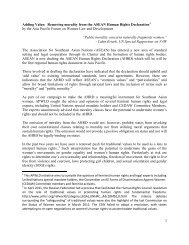A Digest of Case Law on the Human Rights of Women - Asia Pacific ...
A Digest of Case Law on the Human Rights of Women - Asia Pacific ...
A Digest of Case Law on the Human Rights of Women - Asia Pacific ...
You also want an ePaper? Increase the reach of your titles
YUMPU automatically turns print PDFs into web optimized ePapers that Google loves.
Imelda Romualdez-Marcos v Commissi<strong>on</strong> <strong>on</strong> Electi<strong>on</strong>s and Cirilo Roy M<strong>on</strong>tejo (Philippines)<br />
change a wife’s domicile to that <str<strong>on</strong>g>of</str<strong>on</strong>g> her husband. The Family Code replaced <strong>the</strong> term<br />
“residence” (used in <strong>the</strong> Civil Code) with <strong>the</strong> term “domicile”. Article 69 <str<strong>on</strong>g>of</str<strong>on</strong>g> <strong>the</strong><br />
Family Code gives a husband and wife <strong>the</strong> right to jointly fix <strong>the</strong> family domicile.<br />
The provisi<strong>on</strong> recognised revoluti<strong>on</strong>ary changes in <strong>the</strong> c<strong>on</strong>cept <str<strong>on</strong>g>of</str<strong>on</strong>g> women’s rights<br />
in <strong>the</strong> intervening years by making <strong>the</strong> choice <str<strong>on</strong>g>of</str<strong>on</strong>g> domicile a product <str<strong>on</strong>g>of</str<strong>on</strong>g> mutual<br />
agreement between <strong>the</strong> spouses. The provisi<strong>on</strong> recognised <strong>the</strong> right <str<strong>on</strong>g>of</str<strong>on</strong>g> women<br />
to choose <strong>the</strong>ir own domicile and removed <strong>the</strong> automatic transfer <str<strong>on</strong>g>of</str<strong>on</strong>g> a husband’s<br />
domicile to his wife.<br />
Justice Flerida Ruth Romero<br />
Justice Romero agreed with <strong>the</strong> findings <str<strong>on</strong>g>of</str<strong>on</strong>g> <strong>the</strong> majority <str<strong>on</strong>g>of</str<strong>on</strong>g> judges that <strong>the</strong> term<br />
“residence” in electoral law is syn<strong>on</strong>ymous with domicile. She also agreed with <strong>the</strong><br />
finding <str<strong>on</strong>g>of</str<strong>on</strong>g> <strong>the</strong> majority that a woman did not lose her domicile when she changed her<br />
residence to comply with <strong>the</strong> Civil Code, which gives a husband <strong>the</strong> right to choose<br />
<strong>the</strong>ir place <str<strong>on</strong>g>of</str<strong>on</strong>g> residence. In coming to her decisi<strong>on</strong> <strong>the</strong> judge relied up<strong>on</strong> a number<br />
<str<strong>on</strong>g>of</str<strong>on</strong>g> internati<strong>on</strong>al instruments that protect <strong>the</strong> rights <str<strong>on</strong>g>of</str<strong>on</strong>g> women and made a number <str<strong>on</strong>g>of</str<strong>on</strong>g><br />
positive statements about <strong>the</strong> role <str<strong>on</strong>g>of</str<strong>on</strong>g> women in c<strong>on</strong>temporary Philippines society.<br />
Justice Romero in her judgment made specific reference to CEDAW and noted that<br />
Article 15(4) grants to men and women “<strong>the</strong> same rights with regard to <strong>the</strong> law<br />
relating to <strong>the</strong> movement <str<strong>on</strong>g>of</str<strong>on</strong>g> pers<strong>on</strong>s and <strong>the</strong> freedom to choose <strong>the</strong>ir residence<br />
and domicile”. Justice Romero noted that <strong>the</strong> impact <str<strong>on</strong>g>of</str<strong>on</strong>g> CEDAW <strong>on</strong> o<strong>the</strong>r laws in<br />
<strong>the</strong> Philippines was significant. She referred to <strong>the</strong> C<strong>on</strong>stituti<strong>on</strong> <str<strong>on</strong>g>of</str<strong>on</strong>g> <strong>the</strong> Philippines<br />
1987 into which <strong>the</strong> values <str<strong>on</strong>g>of</str<strong>on</strong>g> CEDAW had been incorporated. For example, Article<br />
2, secti<strong>on</strong> 11 states that, “<strong>the</strong> State values <strong>the</strong> dignity <str<strong>on</strong>g>of</str<strong>on</strong>g> every human pers<strong>on</strong> and<br />
guarantees full respect for human rights” and Article 2, secti<strong>on</strong> 14 states that<br />
“<strong>the</strong> State recognises <strong>the</strong> role <str<strong>on</strong>g>of</str<strong>on</strong>g> women in nati<strong>on</strong>-building, and shall ensure <strong>the</strong><br />
fundamental equality before <strong>the</strong> law <str<strong>on</strong>g>of</str<strong>on</strong>g> women and men”. She also referred to<br />
<strong>the</strong> Family Code, by which many <str<strong>on</strong>g>of</str<strong>on</strong>g> <strong>the</strong> unreas<strong>on</strong>able strictures <strong>on</strong> Filipino wives<br />
enshrined in <strong>the</strong> Civil Code, were removed. For example, Article 114 <str<strong>on</strong>g>of</str<strong>on</strong>g> <strong>the</strong> Civil<br />
Code had previously stated that a wife could not, without a husband’s c<strong>on</strong>sent,<br />
acquire any property by gratuitous title, except from her ascendants, descendants,<br />
parents-in-law, and collateral relatives within <strong>the</strong> fourth degree. Article 117 similarly<br />
had stated that a husband wields a veto power if a wife exercises her pr<str<strong>on</strong>g>of</str<strong>on</strong>g>essi<strong>on</strong> or<br />
occupati<strong>on</strong> or engages in business, provided his income is sufficient for <strong>the</strong> family,<br />
according to its social standing, and if his oppositi<strong>on</strong> is founded <strong>on</strong> serious and valid<br />
grounds. Article 84 had prohibited a widow from marriage until three hundred days<br />
following <strong>the</strong> death <str<strong>on</strong>g>of</str<strong>on</strong>g> her husband, unless in <strong>the</strong> meantime she had given birth to a<br />
child. The removal <str<strong>on</strong>g>of</str<strong>on</strong>g> <strong>the</strong>se provisi<strong>on</strong>s indicated <strong>the</strong> powerful impact <str<strong>on</strong>g>of</str<strong>on</strong>g> CEDAW <strong>on</strong><br />
Philippines law.<br />
7



